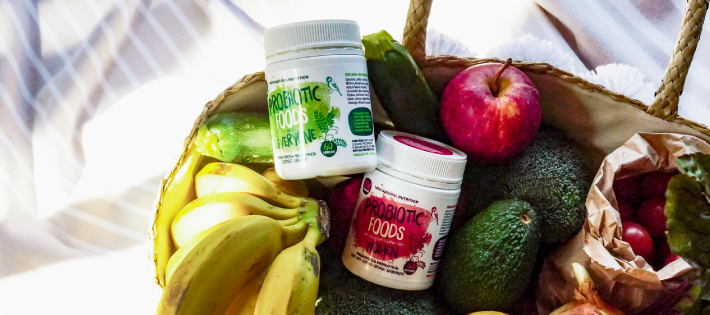Are all probiotic products the same?
Definitely not. Probiotics or good bacteria can come from; dairy, faecal matter, laboratory bred or from food.
The number of probiotics on the label is not necessarily the number that are alive in the pot and in some circumstances the existence of living bacteria in the post can be as low as zero. Many probiotic products have to be refrigerated and the problem here is, can you guarantee that it never sat in the back of a truck or a warehouse without refrigeration?
Our probiotics have been bred to withstand 55 degrees and do not have to be refrigerated but kept in a cool dark place.
Plus our probiotics are alive and viable in their own food source (prebiotics) and tests show that they will on foment meaning because they are alive and viable they are more likely to be beneficial.
How do I know which probiotic is best for me?
There are no errors when making a selection from our range. We have made different blends for specific requirements, but that does not mean you cannot use the rest of the range. Start with the one that attracts you the most and have in mind to try another blend at some stage, for each blend offers different ingredients, which in turn offers different nutritional values.
Should you take a break from a probiotic or just stay on it all the time?
In a perfect environment you could get away with not having a probiotic everyday but unfortunately we do not live in a perfect world! Our gut bacteria can be compromised by many things including chlorine, fluoride, pesticides, birth control pills, stress, pollution, artificial flavour & colours, chemicals in our food, pharmaceuticals or antibiotics. It is a good idea to keep topping up your probiotics daily to assist in supporting your immune system and your gut health. If you stop taking them, your gut bacteria are likely return to their pre-supplementation condition within one to three weeks!
Why don’t I need to keep Probiotic Foods blends and capsules in the fridge?
Whist most probiotics on the market need to be refrigerated. Probiotic Foods blends do not need refrigeration; they only need to be stored in a cool, dark place. The probiotics have been stressed to hot and cold so they will survive where others may not. One reason for this is that the probiotics (good bacteria) are lying dormant in the powder. They stay this way until the PH changes when you ingest the powder, once activated they multiply by the millions.
What happens if I take too much?
This is an interesting question because if your body is toxic or if you are not in very good health you will notice a reaction to the foods immediately. This is why we like first time users to start with 1/8th of a teaspoon until they adjust to having nutrition at the level available in Probiotic Foods. For example, if you have not had a good diet for a long time, or if you have a compromised digestive system, you may not have been getting the goodness from food for years. To have an over-consumption of nutrition after such a long time will have mild effects—such as loose stools—so best to always start small and work towards the nutritional value of Probiotic Foods as well as the benefits the good bacteria (probiotics) have on all living things.
What is the difference between the blends?
Our entire range of probiotic blends and capsules all contain the same beneficial strains of bacteria. What makes them different is the specially selected organic wholefoods. Because every one is different and unique, we have made five different blends with different organic wholefoods to create a product suitable for our individual needs. We even have a probiotic for the family pet!
What is the difference between probiotics + prebiotics and why do I need both?
In our blends, the probiotics are alive in their own food source. That food source is ingredients that have been broken down by the bacteria, and that food source is now called a prebiotic. Probiotics on their own do not have this advantage. No need to refrigerate! Our naturally resistant probiotics survive where others cannot as they have been stressed to a wide range of temperatures, and in their own food source.
Can Probiotic Foods really make a difference?
See Don’s Healthier You video below…

